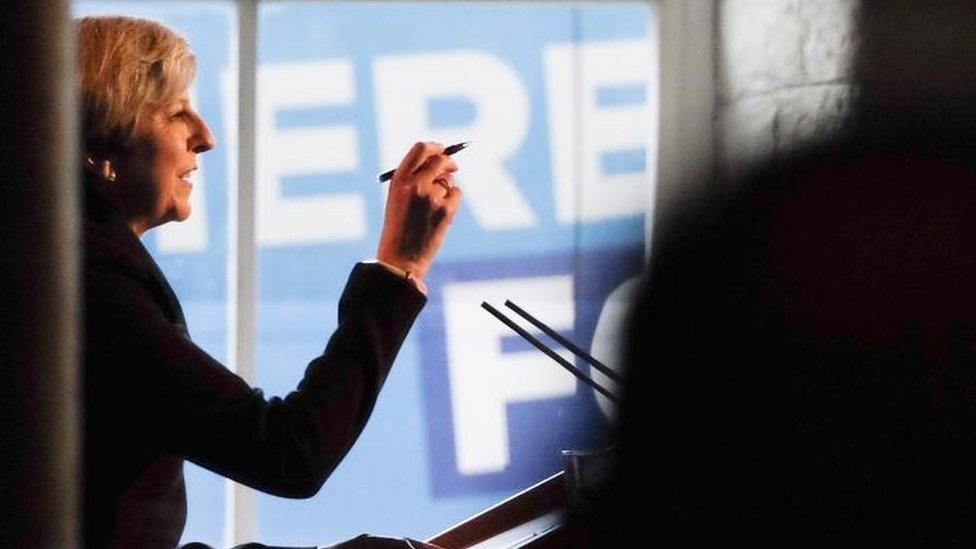May - more room to borrow and raise taxes
- Published
- comments

In my interview with Philip Hammond last month, the Chancellor pleaded that he did not want to have his hands "constrained".
It was a clear signal he wanted to drop the "triple tax lock" put in place by David Cameron before the 2015 election not to raise income tax, national insurance contributions or VAT.
In two out of three, Number 10 appears to have heeded his request.
There is a pledge in the manifesto not to increase VAT.
But the promise not to raise income tax or national insurance has been replaced by a rather vaguer "firm intention to reduce taxes on Britain's businesses and working families".
Many predict that Mr Hammond will resurrect the plan to increase national insurance contributions for the self-employed if the Tories win on June 8 and he remains as Chancellor.
Moving target
Today's manifesto is all about increasing "wriggle room" for any new Conservative government.
Just as the manifesto opens the door to tax rises, it also allows for more borrowing.
It pledges to "balance the books" (meaning the government earns in taxes what it spends on services) and eliminate the deficit by the "middle of the next decade".
That's about three years further into the future than suggested in the Autumn Statement, when Mr Hammond said "the public finances should be returned to balance as early as possible in the next Parliament".
Many economists took that to mean around 2022, given that at that stage we were expecting an election in 2020.
"By pushing out the time by which the government expects to balance the books, it is implicitly telling us that there is likely to be an easing off in austerity," said Alan Clarke of Scotia Bank.
"The government is still trying to reduce borrowing, but is doing so slightly more gradually than previously projected."
Of course, revising deficit targets has become something of a tradition for the Conservatives - who insist they are still firm backers of "sound money".
The first target, set in 2010, was to eliminate the deficit by 2015.
Then it was 2020.
Now it is 2025.
As the old New Yorker cartoon says of the harassed executive desperately searching for a free lunch appointment.
"Never? Is never good for you?"
Room for manoeuvre
In her hunt for fiscal flexibility (there are still fears the economy could take a rapid turn for the worse) Mrs May has also reduced the pensions triple lock to a double lock - abandoning the promise that pensions would rise by at least 2.5% every year.
The double lock says that pensions will now rise by either inflation or earnings growth - whichever is higher.
That could mean pension increases of less than 2.5%, if inflation and earnings growth fall.
Mrs May, with Mr Hammond supporting her from the side lines, has produced a manifesto that gives her good deal of economic room for manoeuvre.
And that is for a reason.
Before 2010 and 2015, the Tories believed their "sell" to the voter was that they could be "trusted" with the public finances and that people wanted a rapid reduction in government borrowing.
That belief has changed.
In an era of falling real incomes and struggling productivity growth (the actual way to create economic wealth), the focus has moved to more active support for the economy.
Even if that means taxing and borrowing more.